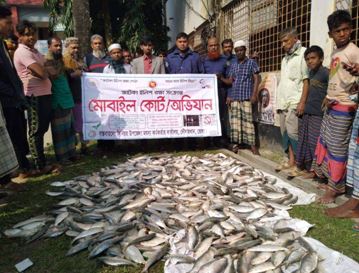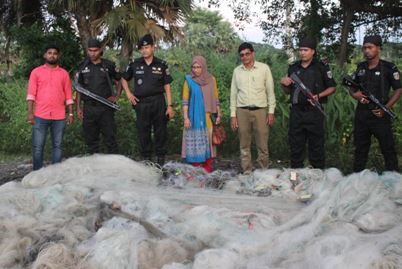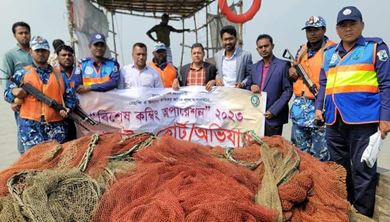
By Badal Nur
DHAKA, June 7, 2024 (BSS) – The government is strengthening hilsa conservation activities in 29 coastal districts with a view to protecting brood hilsa fish and thus boost its production in the country.
The Department of Fisheries is implementing a project titled 'Hilsa Resource Development and Management' in 134 upazilas of 29 districts, making the coastal fishermen, who catch fish from the Bay of Bengal, aware of the importance of the natural resources.
Under the project, a social awareness campaign is being carried out among the fishermen, asking them not to catch brood hilsa and jatka, project officials said.
Besides, they said, the government is providing financial support and alternative livelihood options for the fishermen in 107 upazilas in 27 districts to prevent them from catching hilsa during its breeding period.
They are holding meetings with fishermen and disseminating messages through laudspeakers, TVC campaigns, posters, and leaflets at the upazila level and on the banks of rivers.

The Department of Fisheries started planning hilsa resource management at field level in 2009, resulting in a gradual increase in hilsa production. In continuation of that, the “Hilsa Resource Development and Management” project was undertaken in 2020.
Fisheries and Livestock Minister Abdur Rahman said, “The awareness campaign will continue for the conservation of brood hilsa.”
He said the Ministry of Fisheries and Livestock and the Department of Fisheries, in association with local administrations, police, navy, coast guard, and naval police, are conducting drives to check the use of illegal fishing nets and other gear that destroy fisheries resources in the country’s coastal region.
“The mobile courts are conducting joint operations as a crash programme to stop illegal fishing during the ban period,” he added.
Abdur Rahman said the fishermen community of the country is poor, and in most cases, their participation in government activities remains limited as they live in remote and hard-to-reach areas.
He said hilsa is the national fish of Bangladesh and one of its natural resources. The significance of hilsa in the country's economic development, employment, export income, and protein supply is immense, he added.
The minister said, “The contribution of hilsa to the country’s total fish production is the highest, with about 12.23 percent, while its contribution to GDP is over one percent. Hilsa is the main source of livelihood for the local fishermen,” he said.
He said about six lakh fishermen are directly involved in catching hilsa, while around 25 lakh fishermen are indirectly involved in the profession.
Bangladesh ranks top among 11 hilsa producing countries in the world as about 80 percent of the world’s total hilsa production comes from Bangladesh.
“Indiscriminate destruction of hilsa and jatka and other small fish is not only destroying hilsa resources, but also putting the coastal ecosystem in peril,” Abdur Rahman mentioned.
A huge number of fishermen get unemployed during the ban on catching hilsa and jatka, so they face a hard time bearing their family expenses.
In such a situation, the minister said, the government, under the project is distributing poultry and goats to 31,700 fishermen so that they can manage alternative livelihood during the ban period.
To advance this programme, 31,700 fishermen are being imparted trade-based residential training for three days, while fishermen are being encouraged to take an alternative livelihood through training.
Even after raising public awareness and providing alternative livelihoods, drives are being conducted in rivers, fish markets, fishing ghats, and haats by the Fisheries and Livestock Ministry.
Project director Mullah Emdadullah said the operation must continue against the fishermen to stop catching brood hilsa to boost hilsa production.

He said the hilsa production was 2.29 million tonnes in fiscal 2000-01, but it declined to 1.99 million tonnes in 2003-04.
“Now, the production of hilsa has increased significantly due to pragmatic measures taken by the incumbent government under the leadership of Prime Minister Sheikh Hasina,” he added.
He said public awareness is being carried out for the conservation of brood hilsa and jatka through the distribution of 10,000 legal fishing nets to fishermen, while alternative employment opportunities have been created for 30,000 families of fishermen.